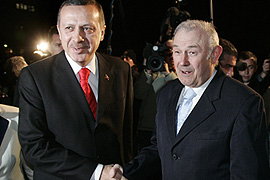Security officials meet in Munich
Nato’s Afghanistan mission and Europe-based missile defence are conference’s focus.

Published On 9 Feb 2008
Security was tight on Saturday morning, with 3,700 police on hand and entire sections of the business hub of Munich blocked off near the Bayerischer Hof hotel, where the meeting is being held.
About 300 demonstrators protested under the motto “against the Nato war conference” outside the security zone.
John McCain, the US senator who is a regular at the conference, sent word that he would not attend as he focused on locking up the Republican nomination for the presidency.
Afghanistan
McCain stressed the need for an increased Nato presence in Afghanistan, and for countries to suspend “the debilitating restrictions on when and how those forces can fight”.
It was a point that seemed sure to be repeated by Gates, who arrived in Munich on Friday from talks with Nato partners in Lithuania.
He acknowledged that lingering anger in Europe over the US invasion of Iraq explains why some allies are reluctant to heed US calls for more combat troops in Afghanistan.
He said he would attempt in his speech on Sunday to decouple perceptions of the Iraq war, in which Nato has no fighting role, from views of Afghanistan, where Nato is in charge of the fighting.
France said it was considering sending troops to fight the Taliban in southern Afghanistan in response to an appeal from Canada for 1,000 extra troops to support its beleaguered force in Kandahar province.
Conference host Germany agreed this week to a Nato request to send about 200 troops to serve in a quick reaction force in northern Afghanistan.
But Angela Merkel, the German chancellor, again rejected sending soldiers to the south.
Russia
Last year’s conference produced fireworks when Vladimir Putin, the Russian president, accused the US of starting another Cold War by planning to base parts of a missile-defence system in Poland and the Czech Republic.
Sergei Lavrov, the Russian foreign minister, said on Thursday that the plans were an example of “imperial thinking”, and suggested Washington was trying to encircle Russia.
But writing in Munich’s Sueddeutsche Zeitung newspaper on Friday, McCain said “genuine partnership remains open to Moscow, but only if it chooses to uphold its responsibilities to the international community and its own citizens”.
He said: “We need a unified Western approach to a revanchist Russia whose leaders seem more determined to chart an old course of conflict rather than join the democratic peace of the West.
“We should start by ensuring that the G-8 becomes again a club of leading market democracies: it should include India and Brazil but exclude Russia.”
Turkey
Recep Tayyip Erdogan, the Turkish prime minister, who opened the conference, said his country will continue its fight against Kurdish separatists in northern Iraq “until we win”.
He said the fight against the PKK was part of the world’s war against terrorism.
 |
| Erdogan is expected to focus on Turkey’s foreign policy and security interests [AFP] |
“Let me put it very clearly …” he said.
“We are going to continue until we win.”
Erdogan said: “Turkey is not interested in one inch of territory that belongs to Iraq.
“In fact, Turkey is the largest supporter of the territorial integrity of Iraq.”
Washington has worried that an all-out Turkish push against the rebel group PKK could destabilise what has been one of the calmest regions in Iraq.
But the operations to degrade PKK strength has been backed by the US.
Kosovo
Boris Tadic, the pro-Western Serbian president, addressed the opening dinner on Friday, warning guests that accepting a declaration of independence from Kosovo could have serious ramifications.
Kosovo’s ethnic Albanian leadership has said a declaration could be made within days.
“Should Serbia be partitioned against its will – which is what the imposed independence of Kosovo is in truth – it could in turn result in the escalation of many existing conflicts, the reactivation of a number of frozen conflicts, and the instigation of who knows how many new conflicts,” Tadic said.
But he said “there is still time to prevent the situation from spiralling needlessly out of control”, and urged international talks.
Source: News Agencies